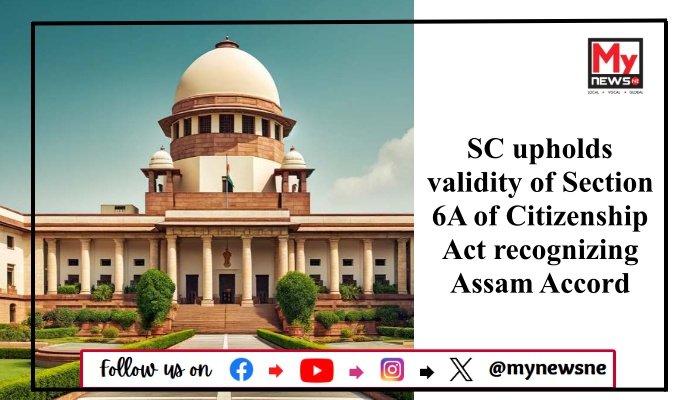Supreme Court Upholds Constitutional Validity of Section 6A of Citizenship Act in Landmark Judgment
National: In a significant ruling on October 17, 2024, the Supreme Court of India upheld the constitutional validity of Section 6A of the Citizenship Act, 1955, which incorporates key provisions of the Assam Accord. The judgment has far-reaching implications for Assam’s sociopolitical landscape, especially concerning illegal migration and citizenship issues.
Key Takeaways from the Judgment
4:1 Majority Verdict
A five-judge bench led by *Chief Justice of India DY Chandrachud, with Justices Surya Kant, MM Sundresh, and Manoj Misra, ruled in favor of upholding Section 6A. Justice JB Pardiwala dissented, declaring the provision unconstitutional.
The court emphasized that Assam faces a higher migrant influx, with 40 lakh migrants identified—significantly larger in proportion to its smaller land size compared to other border states like West Bengal.
Rationality of Assam-Specific Legislation
The court justified treating Assam differently from other states, pointing to the higher percentage of illegal migrants. It upheld the March 25, 1971 cut-off date for citizenship, tying it to the end of the Bangladesh Liberation War, and deemed the date rational.
Impact on Article 29 (1)
The court observed that the presence of ethnic groups in Assam does not necessarily violate the right to protect linguistic and cultural heritage under Article 29. Petitioners must demonstrate concrete harm to one group’s survival or heritage caused by another group’s presence, which was not sufficiently proven.
Petitioners’ Contentions Against Section 6A
- Violation of Constitutional Principles: Petitioners argued that Section 6A violated the ideals of fraternity, unity, and integrity outlined in the Preamble of the Constitution.
- Infringement on Fundamental Rights: The provision was challenged under Article 14 (Right to Equality), Article 21 (Right to Life and Personal Liberty), and Article 29 (Cultural and Educational Rights).
- Impact on Political Rights: Petitioners claimed the section undermines Articles 325 and 326, altering electoral constituencies and diluting local voting rights by changing the voter demographics in Assam.
- Demand for a Nationwide Approach: Petitioners sought a proportional distribution of immigrants across all states and union territories, rather than concentrating them in Assam.
- Security and Land Concerns: Petitioners urged for stronger border fencing, better identification of foreigners, and protection of tribal lands from encroachment.
Implications for Assam
Validation of the Assam Accord
The ruling reinforces the Assam Accord as a legitimate, enforceable policy. This could influence the resolution of ongoing citizenship and migration issues in the state, particularly regarding the National Register of Citizens (NRC).
Ethnic and Political Balance
While the judgment may ease concerns about large-scale migration, it is likely to reignite debates on the ethnic identity of indigenous groups. The NRC process may also come under renewed scrutiny following the court’s decision.
Administrative and Security Reforms
The Union government may now face pressure to accelerate border fencing, improve the functioning of Foreigners’ Tribunals, and address land encroachment concerns, especially those raised by tribal communities in Assam.
This ruling will shape Assam’s approach to managing illegal migration, citizenship issues, and the broader impact on the state’s demographic and political fabric.
Read More: Myanmar National Arrested in Mizoram with Heroin Worth Rs 32.9 Lakh

